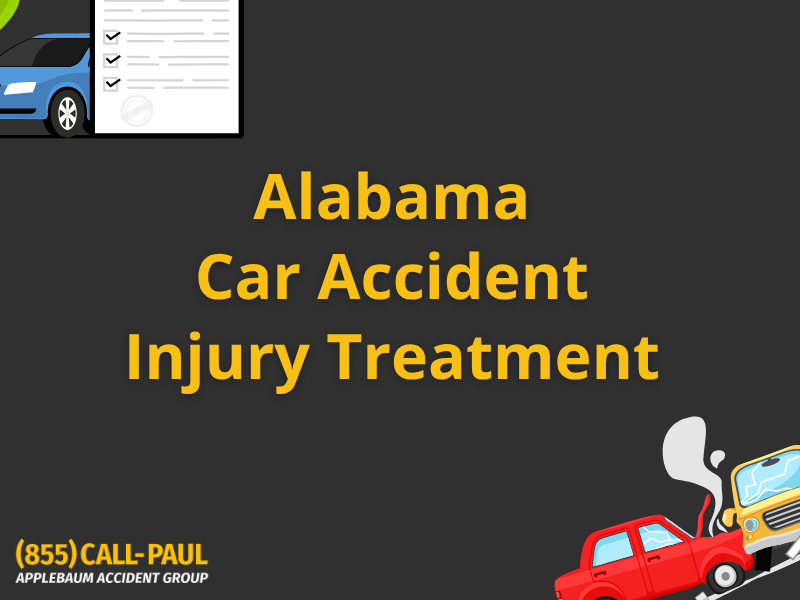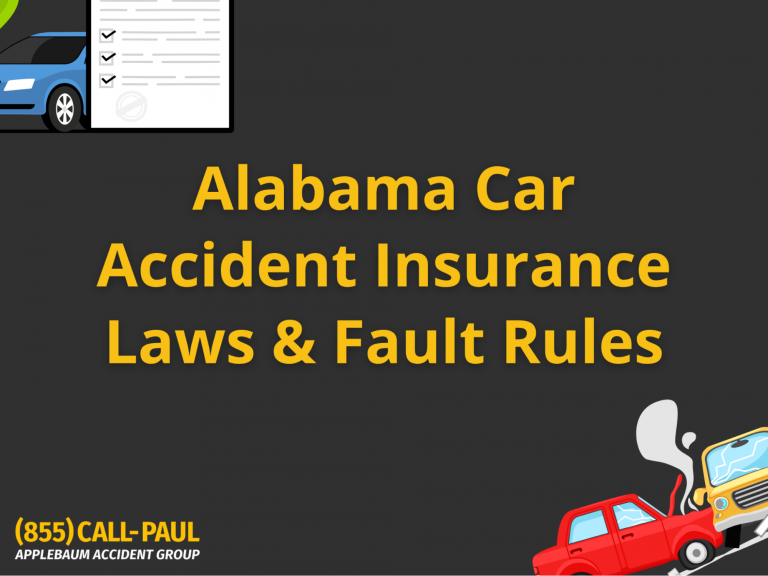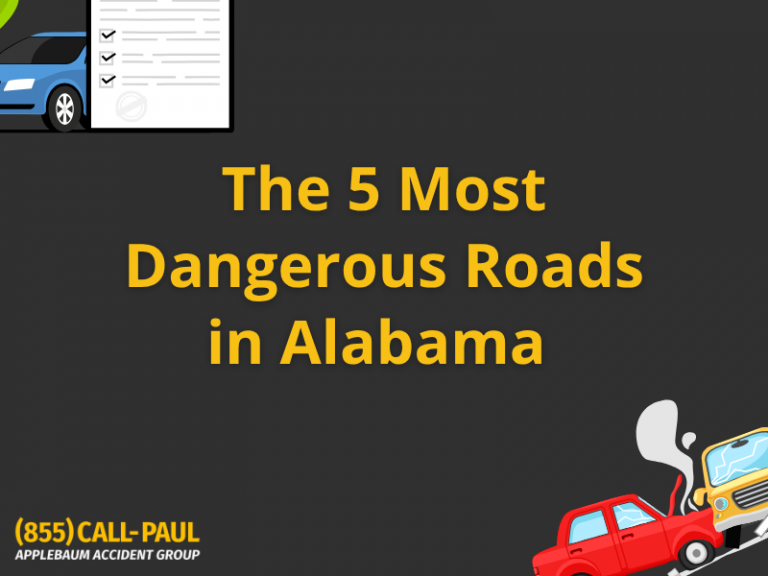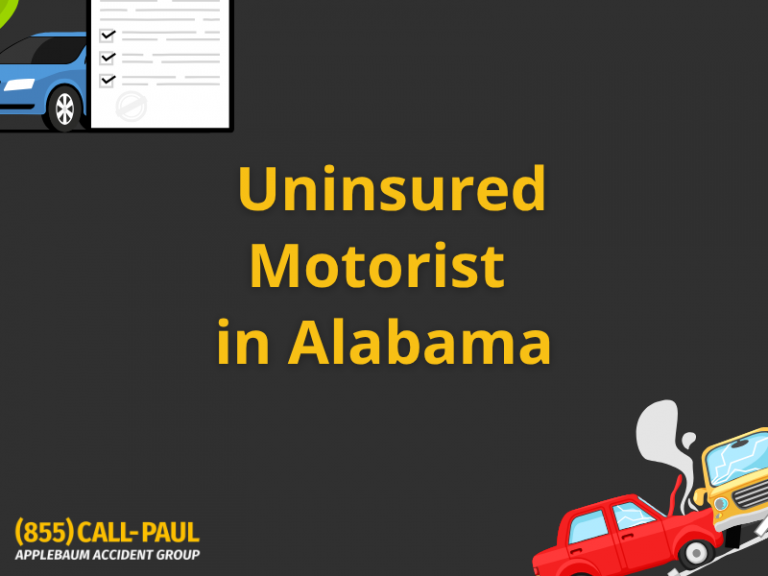If you were injured in a car accident in Alabama, time matters. From medical deadlines to legal delays, the clock starts ticking the moment you’re hit, and every step you take (or skip) can impact your recovery and settlement.
Here’s what to expect in the Alabama injury treatment timeline:
- Start treatment ASAP, ideally within 14 days, to preserve your health and legal options.
- Claims usually wait until you reach Maximum Medical Improvement (MMI), which can take weeks or over a year.
- Insurance disputes and legal negotiations may stretch your timeline even further, sometimes months, sometimes years.
If you’re unsure where to begin, Applebaum Accident Group can connect you with trusted Alabama doctors and attorneys who handle these cases daily, at no cost to you. We’ll help you avoid costly delays and stay focused on healing.
Keep reading for a full step-by-step breakdown, real FAQs from Alabama drivers, and legal tips that could save your case.
From Injury to Compensation: Your 4-Phase Recovery Roadmap After an Alabama Car Accident
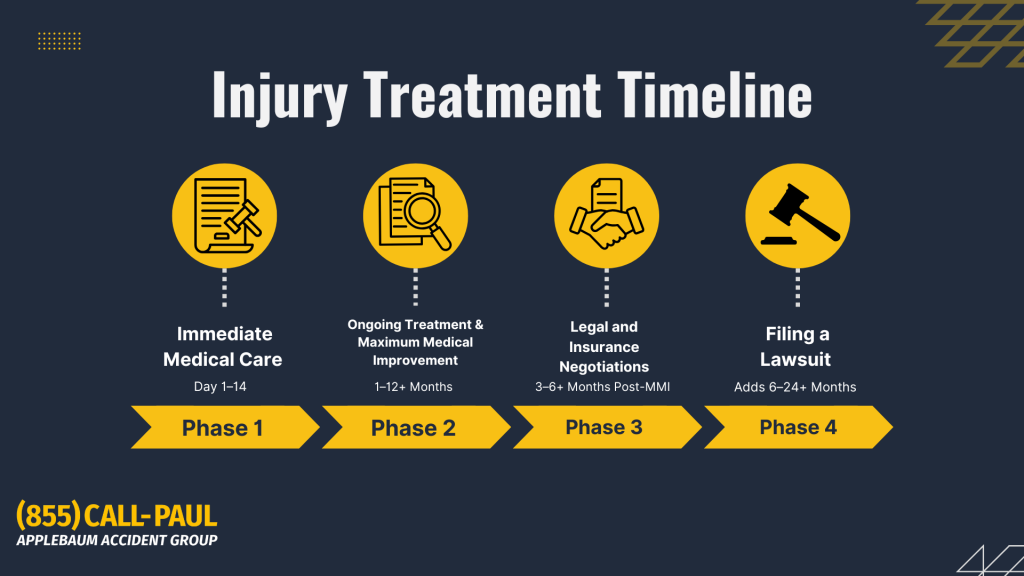
Phase 1 – Immediate Medical Care (Day 1–14)
This is the most urgent phase. You need to get checked out by a doctor immediately, even if you feel fine. Some injuries, like concussions or internal damage, don’t show symptoms right away.
- Go to the ER or urgent care as soon as possible.
- Alabama doesn’t require personal injury protection (PIP), so every record counts for reimbursement.
- While Alabama doesn’t follow Florida’s 14-day rule, delaying care may cast doubt on your injury claim.
- Pro Tip: Insurance companies may argue that a delay means your injuries weren’t serious, or weren’t caused by the crash.
Phase 2 – Ongoing Treatment & Maximum Medical Improvement (1–12+ Months)
After your initial care, expect a longer road to full recovery. Whether it’s physical therapy, diagnostic imaging, or surgery, every follow-up is critical, not just for your health, but for proving your damages.
- MMI (Maximum Medical Improvement) is when doctors say you’ve healed as much as you’re going to.
- Until you hit MMI, you won’t know the full cost of your injury, and that means no fair settlement offer can be made yet.
- Settlement negotiations usually begin after MMI, not before.
Phase 3 – Legal and Insurance Negotiations (3–6+ Months Post-MMI)
Once you reach MMI, it’s time to formally demand compensation. This phase involves paperwork, phone calls, and plenty of patience.
- Submit a demand package with all medical records, lost wage info, and a breakdown of damages.
- Expect the first offer to be low, this is a negotiation, not a conclusion.
- If negotiations stall, mediation can help both parties find middle ground without going to court.
Insight from Real Claims: People often report frustrating delays, especially when insurance companies rotate adjusters or “lose” documents. Staying organized, and having a responsive attorney, makes a difference.
Phase 4 – Filing a Lawsuit (Adds 6–24+ Months)
If negotiations break down, a lawsuit may be the next step. This doesn’t mean your case will end up in court, most lawsuits settle before reaching trial, but filing signals that you’re serious about fair compensation.
Here’s what happens during this phase:
- Discovery: Both sides exchange evidence.
- Depositions: Witnesses and parties are questioned under oath.
- Trial prep: Timelines depend on court scheduling, which can be slow.
Timeline Factors That Speed Up or Slow Down Recovery
Not all cases move at the same pace. Several factors can help, or hurt, your progress:
- Clear liability vs. disputed fault ➤ If the other driver’s fault is obvious, your case moves faster.
- Injury severity and treatment gaps ➤ More complex injuries take longer to treat and settle.
- Documentation issues ➤ Lost records or inconsistent treatment can stall everything.
- Insurance tactics ➤ Delays, repetitive document requests, or changing adjusters slow negotiations.
- Your legal support ➤ A responsive attorney or referral group can keep the process moving, and keep you in the loop.
How To Protect Your Claim
Don’t leave your outcome to chance. Follow these steps to protect your health, and your potential compensation:
- Get medical attention immediately, even for minor symptoms.
- Keep every receipt, report, and appointment summary.
- Show up to every follow-up, and stick with your care provider if possible.
- Wait until you’ve reached MMI before discussing settlements.
- Consult with an attorney referral group early to make sure you’re not navigating this alone.
You’re not alone in asking these questions, and you’re not without options. Keep reading for a summary of what every Alabama crash victim should know before moving forward.
What Alabama Crash Victims Need to Know
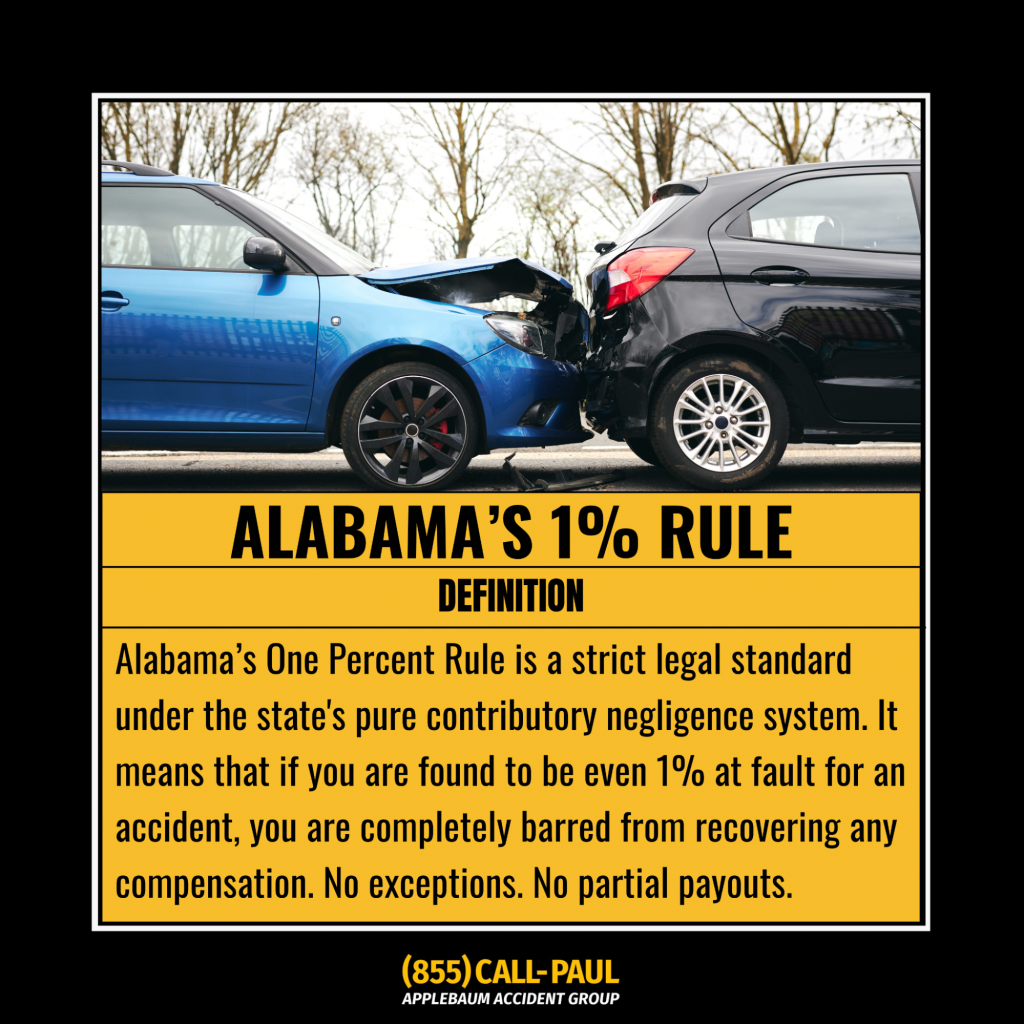
Before you make any decisions, here’s what you absolutely need to keep in mind:
- Even 1% fault in Alabama can ruin your case. Contributory negligence laws are unforgiving, if the other side proves you shared any blame, you could walk away with nothing.
- Don’t underestimate emotional injuries. Anxiety, depression, PTSD, and fear of driving are real after a serious crash. These aren’t just “extras”, they’re legitimate damages if properly documented.
- The clock is ticking. Waiting too long to seek care, gather documentation, or talk to the right experts can destroy an otherwise valid claim.
Ready to Take the Next Step?

If you’ve made it this far, you already know that navigating the Alabama car accident injury treatment timeline isn’t simple. You’ve got deadlines to meet, doctors to deal with, insurers who delay, and legal traps that can shut your claim down before it starts.
That’s where we come in.
At Applebaum Accident Group, we take the pressure off your shoulders by connecting you with professionals who know how to:
- Get you medical care now, even if you don’t have insurance or can’t afford it upfront.
- Pair you with top-rated Alabama car accident attorneys who understand the timeline, the laws, and how to fight back against aggressive insurers.
- Help you avoid the pitfalls that wreck legitimate claims, like missed deadlines, weak documentation, or bad settlement timing.
You don’t need to guess your way through this. You just need a team that knows the terrain.
📞 855-225-5728 | Request An Appointment
👉Applebaum Accident Group will help you take the next right step.
Frequently Asked Questions from Alabama Drivers
Can I include therapy for PTSD in my claim?
Yes. Emotional injuries, including PTSD, are valid parts of a personal injury claim, if they’re properly documented by a licensed professional. It’s crucial to discuss your symptoms with your healthcare provider and keep detailed records for your legal team.
Will switching providers delay my settlement?
Potentially, yes. Gaps in treatment or frequent provider changes can raise red flags for insurance adjusters. Always consult with a medical or legal advisor before making any changes to your care team.
How do I survive financially while waiting on a claim?
You’ve got options. Some medical providers work on a lien basis, meaning they’ll treat you now and get paid from your eventual settlement. Legal networks may also help you access pre-settlement funding to cover essentials like rent and groceries.
How long after an accident can I claim injury in Alabama?
Up to 2 years. That’s the statute of limitations for personal injury claims in Alabama. But act fast, seeking medical treatment within 14 days helps legitimize your injury and strengthens your claim.
How long do injuries take to heal?
It varies. Soft tissue injuries might resolve in weeks, while fractures, surgeries, or nerve damage could take months, or longer, with ongoing rehab.
Is Alabama a no-fault state?
No. Alabama is an at-fault state, and it applies pure contributory negligence. That means if you’re even 1% at fault for the accident, you could be denied any compensation. It’s a harsh rule, so choosing the right legal support is critical.
How long do accidents stay on your insurance?
Usually 3 years. But how it affects your premium depends on your provider and whether you were found at fault. Some insurers offer accident forgiveness, while others may increase your rates significantly.
What if I disagree with my doctor’s MMI call?
You can push back. Seek a second opinion or request additional diagnostic testing if you believe your recovery isn’t complete.
What if my pain returns after settlement?
Unfortunately, you’re likely out of options. Once you sign a release and accept a settlement, reopening the claim is almost impossible. This is why it’s crucial not to rush the process, especially if symptoms are still evolving.
What if my lawyer is stalling or doesn’t keep me updated?
You’re not stuck. You have the right to change attorneys if communication breaks down or you feel your case isn’t being prioritized.

